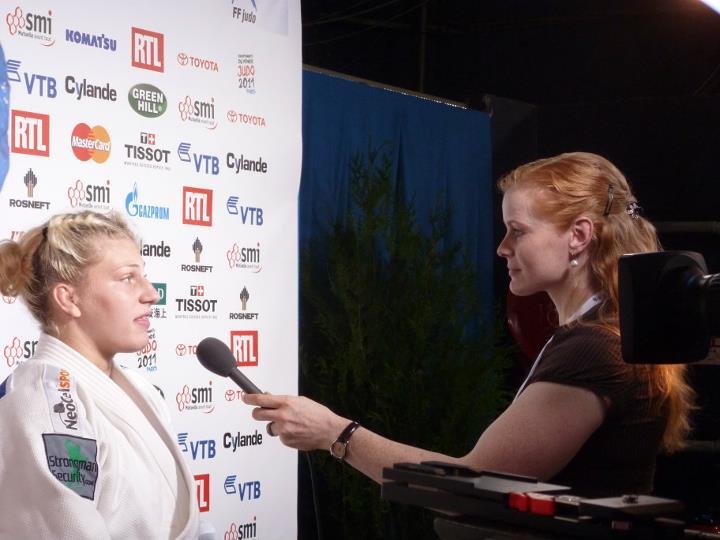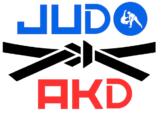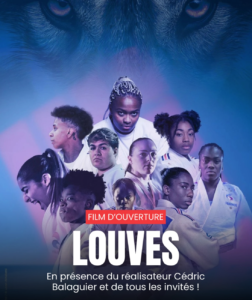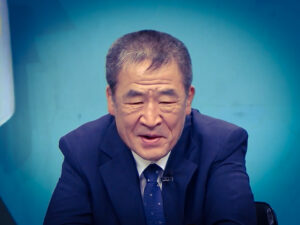Born on January 8, 1980 in Meerane, East Germany, Annett Böhm was Olympic bronze medallist of the U70kg category in Athens 2004 (5th in Beijing 2008) and World bronze medallist in Osaka 2003 (5th in Cairo 2005). She used to fight with most of the big names of her generation: Gévrise Emane, Edith Bosch, Ulla Werbrouck, Ronda Rousey, Masae Ueno… For years now she is one of the voices of judo. She explains the why and the how. – JudoAKD#008.
A French version of this interview is available here.

You will commentate the Olympics this year. How will it be organized?
For the first time, I am allowed to comment judo on the public broadcaster for ARD. In Germany we have two public broadcasters: ZDF and ARD. The broadcast of the Olympic Games takes place alternately. I am extremely proud and happy about that! Like the biggest team journalists who work at the Olympics 2024, I will be in Mainz and commentate from there.
You used to commentate for Judo TV. When and how did it start?
I started in 2011 – my first event was the European Judo Championships in Istanbul. During the years, I had a lot of events where I worked as a commentator, for EJU (European Judo Union) and IJF (International Judo Federation). When the IJF world tour took place in Germany I also commentated – but then for the German TV. On the international circuit I mostly commentate with Sheldon Franco-Rooks. There were times when I travelled from one event to the other – the whole year. Meanwhile it is getting less. Also because of my job as a journalist and because of my family. My last one was the Tokyo Grand Slam in December 2023. But even if I am not there I watch it and follow the results.
You work also beside the judo events. What do you do exactly?
My main work is with the MDR (Mitteldeutscher Rundfunk) – a regional public TV channel in Leipzig, where I live. I have sports, consumer and health topics and do television reports, news reports, live-talks but also magazine articles that are up to 10-15 minutes long. Everything is included, from various sports over the fate of people who have a special illness or the latest medical treatment methods to social issues. It is this diversity that inspires me.
What is your average weekly agenda (if there is one)?
I have no regularities at work. There are weeks when I sit at the station and work with TV material for television shows, and then there are weeks when I’m filming or editing and producing contributions myself. That’s what makes my work so appealing; it never gets boring.
In May 2023, your were the co-director of The War and Us – Ukrainian Judoka Between Sport and Front, a 30 minuts-long documentary in Ukraine with many intense interviews of judo athletes…
Yes, that was a project close to my heart and I’m glad I was able to do it. It was my first documentary. It took me half a year to complete the 30 minute one. I was deeply touched by how the Ukrainian judoka have lived and trained since the outbreak of war. How they have their big goal in mind – the 2024 Olympics – under all that difficult circumstances. I will also pay special attention to those who will be there in Paris and what their competitions will be like.
What feedbacks did you receive from it, once it was screened on German TV?
The feedback from the Ukrainian judoka and my colleagues was great. But that’s not why I made the film. My journalistic task is not to get favours from the protagonists. My job is to critically scrutinize and categorize topics. I made the documentary to show what the situation is like in Ukraine and what that means for the athletes who want to qualify for the Olympics.
Voir cette publication sur Instagram
Une publication partagée par Sport im Osten (@spio_sportimosten)
What is the difference between sport journalism and war journalism, for you?
In regard to my work there is no difference whether it is sporting or war journalism. Research has to be done in exactly the same way. The only difference is: when it comes to war, there is nothing nice to report. No moments of success or happiness like in sport. There is only suffering.
When you commentate judo, what do you try to do: to explain the moves? To explain the stories of the athletes?
I try to categorize actions and provide additional information. I don’t like when people only describe exactly what they can see anyway. What’s more interesting is why things happen, how it came about, what’s special about it or what the consequences are. Of course, I also reflect my own experiences from the past. Logically, I can empathize with situations.
What questions do you have in mind when you are commentating?
What I find important when categorizing actions is to find answers to these questions: how high is the competitive pressure in the team? Why did a judoka lose? Was it unnecessary? Had he always won the last few times? Did he win for the first time against the one judoka? Was there a long injury break beforehand or is the person not quite fit? This kind of stuff.
Do you prepare a lot before?
Of course. As a journalist, you have to be prepared, to do your research and, if possible, to seek direct dialogue with the athletes. This work is what makes it so exciting for me.

What did the Annett journalist/commentator learn from the Annett competitor? I mean about working habits, discipline, etc.
Above all, I have learned to fight for things, to take challenges, to deal with criticism, to question things again and again and to do things better. I ask myself every day in my work whether it was good and what I can do better. My sport has made me very structured. I plan things and follow them through. I haven’t lost this ambition, I’ve taken it with me – from the tatami to work.
Let’s talk now about your first career: why judo?
I was 7 when I started judo. I found out about it from friends at school and then nerved my parents until they went with me. I fell in love with the sport from the very first day of training. Competing, the community, fighting against each other, outwitting each other on the judo mat – that was absolutely my thing. Before that, I had briefly played handball in a school club. But in the end I chose judo and have never regretted it!
Are you from a judo family?
None of my family did judo. My mother was a handball player and my father was a boxer. My brother was a wrestler. So it was all mixed up.
When did it become serious for you?
I have always had extreme ambition. I won all my competitions, initially with just the few techniques I had learned. I wanted to win and then just went for it on the judo mat. I often received awards as « Best technician ». That gave me extra motivation. I started training every day at the age of 12. That’s when it got « serious » and I knew that I wanted to be really good. From then on, my goal was the Olympic Games. When I was 15, I went to boarding school and sports school in Leipzig, where I trained at the Olympic training center.
You’re born in the East side of the Wall, in the former German Democratic Repubic. What was the impact of the turning point of 1989 on your life ?
When the Wall came down, I was just nine years old. So I had only been doing judo for two years. Absolutely nothing changed for me after that. I wasn’t yet at the age and level where people might have looked at my parents’ party affiliation or whether we had relatives from the West. In this respect, the reunification didn’t play any particular role in my judo career. Training continued seamlessly, at the same club, with the same coaches. Competitions were just the same as in German Democratic Republic times. My goals didn’t change.

What are you the most proud of, now?
Of course I’m proud of what I’ve achieved. My first European Championship title as a junior, my World Championship bronze medal and, of course, that Olympic bronze in Athens. But above all, I’m grateful that I’ve been able to experience all of this, that I’ve been able to lead this life. I’ve had an incredible number of wonderful moments, highs and lows that have taught me a lot and great people that I’ve had the pleasure to meet all over the world. That fills me with gratitude.
Do you have any regrets: 5th places? Semi-finals? Things you understood too late? Or did you live what you had to live?
Fifth place hurts the most. Of course I regret that. There is nothing harder than to have been so close to the medal and then to have missed it and come away empty-handed. It’s the worst place ever… It was particularly painful in Beijing in 2008. I was so close to the final, everything was possible, but that was the problem: in the semi-final I couldn’t handle the early lead. That was purely a mental matter that still annoys me. But: this is also part of my story and I have to accept it.
Was it easy to quit?
It was anything but easy to stop. Almost 15 years of competitive sport – every year anew. Always asserting myself as number one and defending it. But somehow I didn’t really have any other choice. The Olympics had just finished and I know I won’t go for other four years. My studies were over, my national coach was quitting and, last but not least, my body was at its limit. So logically I decided to begin a new chapter in my life.
You quit in 2008 and started to work as a commentator in 2011. How were these three years of transition?
At that time I fell into a deep hole because all of my sporting goals were no longer there. After 2008, I specialized in journalism, gained a lot of experience, and also commented, which was a great variety for me. I then started a traineeship at Mitteldeutscher Rundfunk in my city of Leipzig – in 2013 I made it professionally and I really arrived in my new phase of life. It was a long way to get there.
What advice could you give to those who will quit after Paris 2024, for example?
My advice is this: do things entirely or not at all. If you notice that it is no longer right for you, have the courage to try new things. Find new challenges and tackle them properly. Then you will be happy even after this intense and formative phase of your life.
What would you say to the young journalist you were a decade ago?
I entered professional life about ten years later because of my competitive sport, unlike many of my colleagues. I wasn’t able to follow the usual path like many others. I couldn’t study the normal journalism study, but I achieved my goal with lots of internships and a distance learning course. What I mean by that is that you don’t have to take the traditional route to achieve something. If you’re ambitious enough, you can get there in a roundabout way – and ambition is something you’ve acquired through competitive sport, and many managers also appreciate that. Because they know about the qualities of a competitive athlete… All I can pass on is: have fun and fight to fulfill your dreams. That was true for me when I was doing judo. But also afterwards, when I was looking for and found a new challenge after so many years of competitive sport. It wasn’t easy. But by looking for new goals, I am now very happy with my « second » life.
And if the Annett of 2024 could say a word to the one from 1987 who fastened her first white belt, what would you say to her?
Back then, as a seven-years-old, I would never have imagined what awaited me. All I knew was that I loved this sport more than anything and wanted to win. It was this irrepressible ambition in me that always accompanied me and put me forward. But the fact that I was able to travel to so many countries and get to know so many beautiful people who had the same ambition was something I couldn’t even begin to imagine as a child. The only thing I would have liked to have retained more of was my naivety when it came to excitement and the pressure of expectation. In the end, that hindered my performance. But that is part of the journey, too. – Interview by Anthony Diao, Summer 2024. Opening picture : ©DR/JudoAKD.
A French version of this interview is available here.

More articles in English:
-
- JudoAKD#001 – Loïc Pietri – Pardon His French
- JudoAKD#002 – Emmanuelle Payet – This Island Within Herself
- JudoAKD#003 – Laure-Cathy Valente – Lyon, Third Generation
- JudoAKD#004 – Back to Celje
- JudoAKD#005 – Kevin Cao – Where Silences Have the Floor
- JudoAKD#006 – Frédéric Lecanu – Voice on Way
- JudoAKD#009 – Abderahmane Diao – Infinity of Destinies
- JudoAKD#010 – Paco Lozano – Eye of the Fighters
- JudoAKD#011 – Hans Van Essen – Mister JudoInside
- JudoAKD#021 – Benjamin Axus – Still Standing
- JudoAKD#022 – Romain Valadier-Picard – The Fire Next Time
- JudoAKD#023 – Andreea Chitu – She Remembers
- JudoAKD#024 – Malin Wilson – Come. See. Conquer.
- JudoAKD#025 – Antoine Valois-Fortier – The Constant Gardener
- JudoAKD#026 – Amandine Buchard – Status and Liberty
- JudoAKD#027 – Norbert Littkopf (1944-2024), by Annett Boehm
- JudoAKD#028 – Raffaele Toniolo – Bardonecchia, with Family
- JudoAKD#029 – Riner, Krpalek, Tasoev – More than Three Men
- JudoAKD#030 – Christa Deguchi and Kyle Reyes – A Thin Red and White Line
- JudoAKD#031 – Jimmy Pedro – United State of Mind
- JudoAKD#032 – Christophe Massina – Twenty Years Later
- JudoAKD#033 – Teddy Riner/Valentin Houinato – Two Dojos, Two Moods
- JudoAKD#034 – Anne-Fatoumata M’Baïro – Of Time and a Lifetime
- JudoAKD#035 – Nigel Donohue – « Your Time is Your Greatest Asset »
- JudoAKD#036 – Ahcène Goudjil – In the Beginning was Teaching
- JudoAKD#037 – Toma Nikiforov – The Kalashnikiforov Years
- JudoAKD#038 – Catherine Beauchemin-Pinard – The Rank of Big Sister
- JudoAKD#039 – Vitalie Gligor – « The Road Takes the One Who Walks »
- JudoAKD#040 – Joan-Benjamin Gaba and Inal Tasoev – Mindset Matters
- JudoAKD#041 – Pierre Neyra – About a Corner of France and Judo as It is Taught There
- JudoAKD#042 – Theódoros Tselídis – Between Greater Caucasus and Aegean Sea
- JudoAKD#043 – Kim Polling – This Girl Was on Fire
- JudoAKD#044 – Kevin Cao (II) – In the Footsteps of Adrien Thevenet
- JudoAKD#045 – Nigel Donohue (II) – About the Hajime-Matte Model
- JudoAKD#046 – A History of Violence(s)
- JudoAKD#047 – Jigoro Kano Couldn’t Have Said It Better
- JudoAKD#048 – Lee Chang-soo/Chang Su Li (1967-2026), by Oon Yeoh
Also in English:
- JudoAKDReplay#001 – Pawel Nastula – The Leftover (2017)
- JudoAKDReplay#002 – Gévrise Emane – Turn Lead into Bronze (2020)
- JudoAKDReplay#003 – Lukas Krpalek – The Best Years of a Life (2019)
- JudoAKDReplay#004 – How Did Ezio Become Gamba? (2015)
- JudoAKDReplay#005 – What’s up… Dimitri Dragin? (2016)
- JudoAKDReplay#006 – Travis Stevens – « People forget about medals, only fighters remain » (2016)
- JudoAKDReplay#007 – Sit and Talk with Tina Trstenjak and Clarisse Agbégnénou (2017)
- JudoAKDReplay#008 – A Summer with Marti Malloy (2014)
- JudoAKDReplay#009 – Hasta Luego María Celia Laborde (2015)
- JudoAKDReplay#010 – What’s Up… Dex Elmont? (2017)
And also :
- JudoAKDRoadToLA2028#01 – Episode 1/13 – Summer 2025
- JudoAKDRoadToLA2028#02 – Episode 2/13 – Autumn 2025
JudoAKD – Instagram – X (Twitter).




